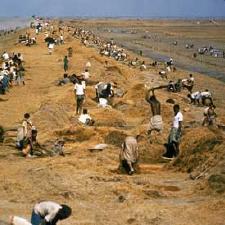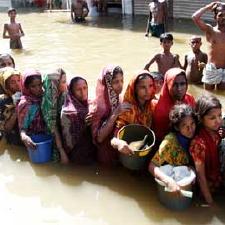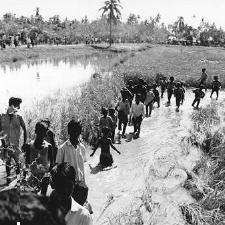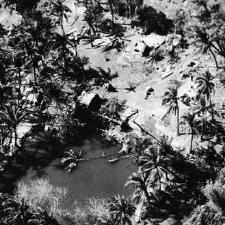Adil Najam
 It wiped out villages. Destroyed crops. Over 3.6 million people were directly affected. Nearly 85% of the area was destroyed. Three months after the catastrophe some 75% of the population was receiving food from relief workers (more here).
It wiped out villages. Destroyed crops. Over 3.6 million people were directly affected. Nearly 85% of the area was destroyed. Three months after the catastrophe some 75% of the population was receiving food from relief workers (more here).
It happened in Pakistan. Yet few Pakistanis even know of it by name. Fewer still remember that it eventually contributed to Pakistan’s break-up.
The 1970 Bhola cyclone hit then East Pakistan on November 12, 1970. It brought with it winds of an unbelievable 185 km/hr. It left in its wake a half million Pakistanis dead.
Meteorologists remember it as being one of the most deadly natural disasters in human history – sources suggest that it left between 300,000 to 1 million Pakistanis dead in its wake; most estimates suggest around 500,000 Pakistanis died.
Historians tend to agree that although there were many other forces at work, the devastation caused by the cyclone and the widespread view that the government had mis-managed the relief efforts and West Pakistan had generally shown an attitude of neglect, contributed to high levels of anti-West Pakistan feeling, a sweeping victory for the Awami League, and eventually the breakup of Pakistan and the creation of Bangladesh.
Such, then, are the forces of nature. And such are the forces of history.
As we hear newspaper headlines proclaiming the historic magnitude and devastation wrought by the floods on our plains, it is worth remembering that 40 years ago The New York Times was describing another calamity in Pakistan as the “Worst Catastrophe of the Century.” Much more importantly, we should pay close attention to the lessons of history, and the lessons of nature.
The lesson of how policy mismanagement led to public dissatisfaction and eventually contributed to national dismemberment is a stark reminder. It may not be an entirely applicable parallel since so much more had already happened and gone wrong in the East Pakistan case (and the cyclone was a contributor to, not the cause, of how history unfolded) but it is a lesson that should not be lost on the politicians, policy-makers and people of Pakistan.
The famous national song, “Ghar Tou Akhir Apna Hai” by Shahnaz Begum was, in fact, written in response to Bhola:
There is a reason why disasters require national solidarity. Without it, they can become even more disastrous and deeply buried fissures in the social fabric can burst forth in volcanic anger. As we look around at the political, policy and citizen response to the current floods, one sees too many who wish to turn disaster into a political opportunity. Those who do would be well advised to remember Bhola. Indeed, we would all be well advised to remember Bhola. (Some of these implications, including on the swell on anti-West Pakistan feelings in the 1970 elections, is discussed in my later article on the political implications of Cyclone Bhola, here).
I write these lines with some trepidation and with great caution. History is not a predictive science. And I do not believe that there is a real parallel between the two situations.
But I do believe that there are important lessons to learn from our own mistakes. For the sake of our present, if not of our past, let us resolve not to make the same mistakes again. Let us not forget what is the real lesson of Bhola in 1970, as of so many other tragedies: dissatisfaction in times of crisis can be a force of agony, and political catastrophe can sometimes grow from seeds sown in natural disaster.
























































This is a very sobering story. Both for our misplaced understanding of how Bangladesh happened, and for what is happening to the floods now.
Thanks, our generation saw the war, but this background event was not known to us.
Eerily, yes, you all are commiting the same blunder in Sindh today, there has been too much favortism & media attention for Punjab and in time of floods to Khyber Pakthunawa and neglect of poor in Sindh and Balochistan.
Also the greatest blunder of breaking of western canals on Taunsa, Guddu barrage instead of dry eastern banks, your officials have needlessly flooded the more fertile and populated parts of Sindh and caused more misery.
Well the only factor that may not make Sindh breakaway is the lack of political leadership that East Bengal had that time.
“Bhola bolta hay!” (I had not known it by name)
Actually, even fewer may know this, that Pakistanis were for a long time, and knowing how it works, I am sure still, paying for Bhola as a part of federal tax.
But back to here and now, I will present this current “Nuh’s Floods” as an opportunity; perhaps even as a blessing. Only if we see it. Only if we seize it. Only if we size it. Only if sear it. Only if we soar from it. Only if we “swar” from it. Only if we “smaaJ” from it.
You see, the corrupt Pakistani system of the 3 jinns (I-Slammed-Everyone-Else-Abad, Karachi and Lahore, who demand three goats and if not goats, three goat-heads. (Google elsewhere at ATP to get the idea.)) have hogged (no pun intended) the nation’s resources and stolen the wealth through the years. They have shown no interest in the sharing with equity and justice.
First, regardless of the current year’s crop, as someone pointed out, the next seven will be the best. The nature has contributed to the best fertilizer all over.
Second, with entire villages wiped out, it gives a chance to build anew. A clean slate. A fresh start. We do not need to make it too complicated. Let us take the design of Harappa and Mohenjendaro, tweak it here and there, and setup model villages and towns all over Pakistan.
With straight roads, cobblestone pathways, water and sanitation provisions and yes, villages lit with LED power. Low consumption and updated wiring can light up village after village with such little costs. It will amaze the people on how advanced our ancient ancestors were. And how much better living can be achieved with simple self sustaining efforts.
Schools, parks, center shops, you name it. The best design is already there for thousands of years. We just need to reclaim from our glorious past. And the Internet to it.
And yes, my personal priority, courts and police stations that serve the people. Now is the chance to add the 10,000 lower court judges.
And Pakistanis can do this by themselves. No outside help is needed. It will increase employment in every category, every industry.
Third, this has highlighted the most important issue. The thieves of Pakistan are no Robin Hood. It is an exceptional set of circumstances, that Pakistan has wound up with thieves as “leaders”.
And these thieves have stolen Pakistan’s wealth. Parked it outside the country. And our friends are not stupid. They know exactly who owns how much and where. And they know who has what kind of money stashed away in what bank account. And they know who lives what kind of life in these three cities. And they, like a good mortgage lender, want to know how much equity you are going to put into your house before money will be handed to you.
And along with the thieves, are the three jinns. So, if you live in Karachi, Lahore or I-Slammed-Everyone-Else-Abad, do not change your life style, want to enjoy your cars, airplanes, et al and expect that someone will believe you with your ‘hai-hai’, then you have still not seen the light. No one is buying your “gitter-mitter” (as the illustrious Madam put it)
Pay heed, the thieves and the three jinns of Pakistan. Change your ways. Work for equity and justice. Share your resources, as limited as they may be. Sell your official cars, helicopters, planes, boats. Get the “gernale” back in their jeeps. Turn off your air-conditioners. Take a bus or share a car ride instead of one-person-one-car (and I mean this for the secretaries of the departments and directorates.)
Revive the august spirit of 1947 in August of 2010.
Jinnah was the selfless leader. “Khadar” was the silk cloth. Tin roof was the top. People opened their homes. Pencils were the pens. Plain paper was the letterhead.
At independence, the only factories were the few ginning mills. The only thing flammable Pakistan made were matchboxes. The rail cars that came to Pakistan’s share were broken. There was no State Bank, no currency, no money.
Pakistanis are honest, decent, hard working and most importantly, giving people. If you do not believe it, spend an hour with Maulana Edhi.
Stop this public wailing. It is conduct unbecoming.
Get back to your roots of selflessness and self help.
These are the terms of grand rebuild of Pakistan. The long promised dream of Iqbal and Jinnah.
Pakistani people are lucky, they have exceptionally placed friends. Pakistanis have just been hard at luck on not knowing how to work with friends and make things work properly for them.
But, now the luck can change. Only if we see it. Only if we seize it. Only if we size it. Only if sear it. Only if we soar from it. Only if we “swar” from it. Only if we “smaaJ” from it.
And the world will rush in with the USD 200 Billion that is needed for the “grandest” Marshall Plan for Pakistan. They will be happy to chip in their share for Pakistan.
Only if we see it!
I also didn’t know about it. You are doing a good Job.
natural calamities can cause the greatest disasters and we are helpless before these.
perhaps this is a revolution in making… desperation for food, shelter and death of loved ones have left people in devastation…and god forbid such gloomy situation can lead to bloodshed and more chaos.